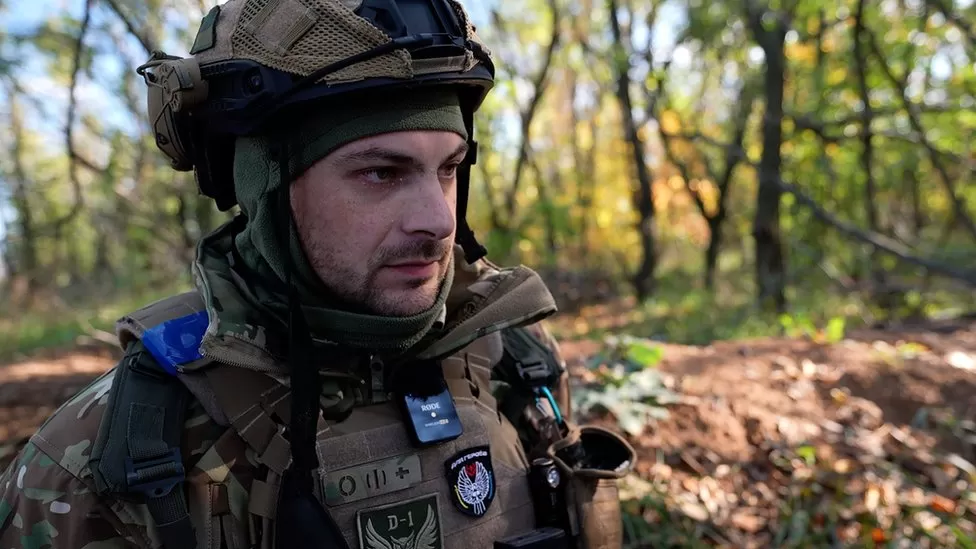Oleksii tells me: “I feel safe here because we are on our land and even the ground will bring me help.” That’s despite the nearby sound of small-arms fire, exploding artillery shells landing within sight and the roar of Russian jets overhead.
The ground he and the small team of Ukrainian troops now occupy is on the border of the Donetsk and Luhansk regions. The same ground that Russian President Vladimir Putin recently declared as being Russian forever.
Over the past week the men of Ukraine’s D1 National Guard Unit have advanced more than 20km (12 miles) east from the recently liberated city of Lyman in Donetsk region. They now occupy a former Russian position in a wood – still within range of the retreating Russian army. Part of “forever Russia” is already back in Ukrainian hands. Russia’s now the defending army.
The reversal in fortunes has been a shot in the arm for Ukrainian troops. There’s a palpable sense of confidence among them, even though they’re still within range. Ilya, another member of the unit, tells me: “We can retake territory, but the Russians cannot.” I ask why? “Because they are weak now, they’re scared of us, they’re running from us.”
This position also tells a story about the difference between Ukrainian and Russian discipline and morale. Strewn across the ground and hanging in trees are remnants of the retreating Russian forces – empty cans, ration packs, boots, bottles and clothes.
Ilya picks up a discarded Russian helmet and compares it with his own. “Army of the future,” jokes Ilya as he taps the Russian helmet. “A very bad future,” adds a comrade, laughing.
It’s not that dissimilar to what Russian troops would have worn in World War Two. They hold up a Russian winter glove and read the label. It says it was made in 2005. “New for Russians,” they joke. Another soldier called Duke says Russia treats its soldiers like meat.
Oleksii says discarded Russian trash often gives away their positions when they fly their small drone. They rely on one of Elon Musk’s Starlink satellite kits for communication. They say it’s been working all week.
As you drive around the Donbas there are more signs of Russia’s depleted army. We witnessed Ukrainian forces towing away a troop carrier and a large self-propelled gun – both still marked with the Russian “Z”.

Ukraine’s now captured more Russian armour than it’s been supplied by the West. Dozens more burnt-out military vehicles, too damaged to salvage, have been left rusting on the sides of roads. Boxes of unused ammunition are collected to be used against their former owners. The Donbas is also still littered with lethal mines – which will take years to clear.
Any sense of euphoria among Ukrainian troops is not always shared among the people they’ve freed from Russian control. Liberation comes with a costly legacy.
Those who survived the shelling are wondering how they’ll make it through the winter. Tens of thousands of people are without power and running water.
In Lyman we come across Natalia and Vitali, searching in the rubble of a bombed out house for wood they can burn. Their fire is now the only way they can stay warm. An estimated 80% of their city has been destroyed or damaged. They narrowly survived a Russian rocket landing on their home – waking them up at 05:30.

Natalia describes life now as “hard and simply unbearable”.
“We are like ants. We were trampled on and those who survived now carry firewood. And those who did not are buried,” she says. Like many here, she tries to avoid blaming either side for her woes.
When we arrive at the centre of Lyman there’s already a long queue for bread. Many of them appear to be hedging their bets on the future.

Kataryna, a mum with two young children, tries to explain her dilemma: Russia, she says, still “has a lot of power, which is why it is scary that they might return. Because the city has already suffered very badly, and if the city will be passed back and forth from hand to hand, then nothing will remain including people”.
At the moment she says all she wants is electricity and peace. This winter she’s unlikely to get either.



